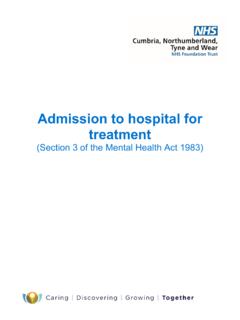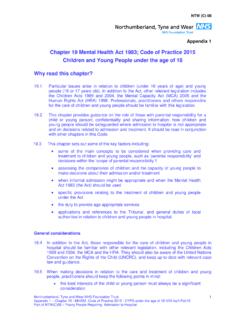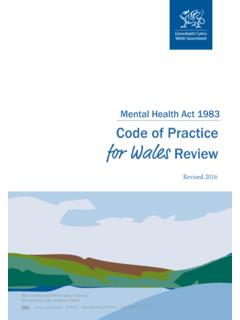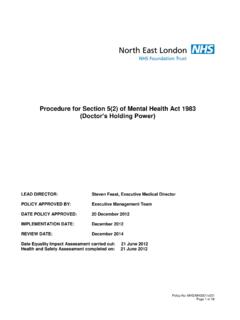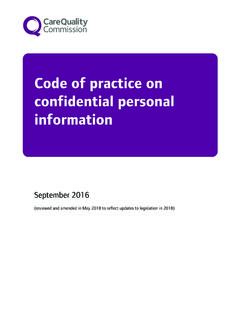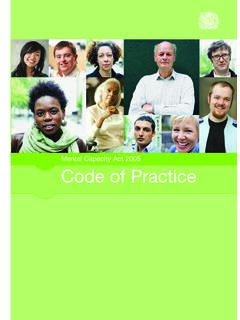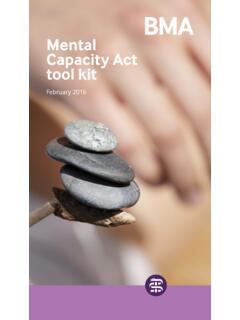Transcription of Mental Health Act 1983 - GOV.UK
1 Mental Health Act 1983 : code of Practice Mental Health Act 1983 : code of Practice Presented to Parliament pursuant to section 118 of the Mental Health Act 1983 Published by TSO (The Stationer y Office) and available , Telephone, Fax & E-mailTSOPO Box 29, Norwich, NR3 1 GNTelephone orders/General enquiries: 0870 600 5522 Fax orders: 0870 600 5533E-mail: 0870 240 3701 TSO@Blackwell and other Accredited AgentsCrown copyright 2015 Applications for reproduction should be made in writing to The National Archives, Kew, Richmond, Surrey, T W9 4DU. e-mail: published 2015 ISBN 978 0 11 323006 89308 Mental Health RTP 107/01/2015 15:01 Everyone including carers and families needs to know about the code and all communication channels from bottom to top and vice versa including sideways should remain open for the benefit of all.
2 Expert Reference Group carerContentsMinisterial foreword 6 The views of service users and carers 7 Acknowledgements 8 Executive summary 9 Introduction 12 Using the Act 21 Chapter 1 Guiding principles 22 Chapter 2 Mental disorder definition 26 Chapter 3 Human rights, equality and Health inequalities 29 Protecting patients rights and autonomy 35 Chapter 4 Information for patients, nearest relatives, carers and others 36 Chapter 5 The nearest relative 49 Chapter 6 Independent Mental Health advocates 54 Chapter 7 Attorneys and deputies 61 Chapter 8 Privacy, dignity and safety 63 Chapter 9 Wishes expressed in advance 74 Chapter 10 Confidentiality and information sharing 78 Chapter 11 Visiting patients in hospital 83 Chapter 12 The Tribunal 87 Assessment.
3 Transport and admission to hospital 95 Chapter 13 Mental capacity and deprivation of liberty 96 Chapter 14 Applications for detention in hospital 113 Chapter 15 Emergency applications for detention 136 Chapter 16 Police powers and places of safety 139 Chapter 17 Transport of patients 153 Chapter 18 Holding powers 159 Additional considerations for specific patients 167 Chapter 19 Children and young people under the age of 18 168 Chapter 20 People with learning disabilities or autistic spectrum disorders 206 Chapter 21 People with personality disorders 220 Chapter 22 Patients concerned with criminal proceedings 224 Underlying principles for care, treatment and support under the Act and good practice which advances equality and protects human rightsIssues of importance when empowering patients in relation to their care and treatment, rights and autonomy, and ensuring they are treated with dignity and respectGuidance in relation to assessment, transport and admission to hospital, detentions under the Act.
4 And use of the Mental Capacity ActFocus on the particular needs of specific patients and the role of professionals responsible for their careContentsCare, support and treatment in hospital 245 Chapter 23 The appropriate medical treatment test 246 Chapter 24 Medical treatment 250 Chapter 25 Treatments subject to special rules and procedures 265 Chapter 26 Safe and therapeutic responses to behavioural disturbance 281 Leaving hospital 315 Chapter 27 Leave of absence 316 Chapter 28 Absence without leave 324 Chapter 29 Community treatment orders 328 Chapter 30 Guardianship 342 Chapter 31 Guardianship, leave of absence or CTO?
5 349 Chapter 32 Detention and CTO: renewal, extension and discharge 352 Chapter 33 After-care 357 Chapter 34 Care programme approach 362 Professional responsibilities 369 Chapter 35 Receipt and scrutiny of documents 370 Chapter 36 Allocating or changing a responsible clinician 373 Chapter 37 Functions of hospital managers 375 Chapter 38 Hospital managers discharge power 385 Chapter 39 Conflicts of interest 394 Chapter 40 Information for victims 397 Annexes 403 Annex A Key words and phrases used in this code 404 Annex B List of policies and procedures 420 Annex C Related material 427 Annex D Flowcharts.
6 Written descriptions 434 Index 438 Guidance on the application of the appropriate medical treatment test and medical treatmentGuidance on the circumstances when patients may leave hospital, including being fully discharged, on short-term leave or to receive care and treatment in the communityAdditional information for professionals with specific responsibilities under the Act and information for victims6 Ministerial forewordSince the last Mental Health Act 1983 : code of Practice was introduced in 2008 there have been substantial changes and updates in legislation, policy, case law, and professional practice.
7 This revised code reflects and embeds developments since then in areas including the use of restrictive interventions, seclusion, use of police powers to detain people in places of safety, and the use of community treatment orders. We promised to improve Mental Health services, and to protect the most vulnerable in society. This code reflects our personal commitment to ensuring this improvement and protection applies to all. We remain committed to ensuring that high quality care is always provided for patients who are subject to the Act. Care and treatment should always be a means to promote recovery, be of the shortest duration necessary, be the least restrictive option, and keep the patient and other people Act affects the lives and liberty of many people, impacting upon them, their families and community.
8 In 2013-14 there were more than 53,000 detentions in England under the Act. This reinforces how important it is to ensure that this document is as up to date, robust, and as accessible as possible. The code safeguards patients rights, ensures compliance with the law and must be considered by Health and social care professionals. The code is used by patients in hospital and those in the community, their families, carers and advocates. It is there to help make sure that anyone experiencing Mental disorder and being treated under the Act gets the right care, treatment and support. Each draft of the code has been read and commented on by a wide range of people and organisations.
9 We are particularly proud to say that this included our experts-by-experience group of patients, former patients and carers, who worked with us from the very beginning. We d like to thank everyone who shared their ideas and their practical experience to ensure that this document is as comprehensive, clear and compassionate as possible. We are confident that we have succeeded in producing a revised code which meets the needs of patients, families, carers and professionals, and presents information in a straightforward and accessible way for all who use Rt Hon Norman Lamb MP Minister of State for Care and SupportThe Rt Hon Jeremy Hunt MP Secretary of State for HealthForeword7 The views of service users and carersYou could ask almost anyone using Mental Health services, or their relative caring for them, what really matters to them and they would say the same.
10 The one thing that makes a difference is knowing that your voice is being heard and that we feel listened to by others. Expert Reference Group service userToo many times in the past, people have tried to speak up about their concerns. They are ignored, their concerns are not acted upon and allowed to escalate until a person has the courage to acknowledge what they are saying, or blow the whistle, and awful failings and abuse are exposed, as in the case of Winterbourne View. The code is designed to stimulate the best possible care, ensure patients rights are protected, and prevent atrocities happening.










